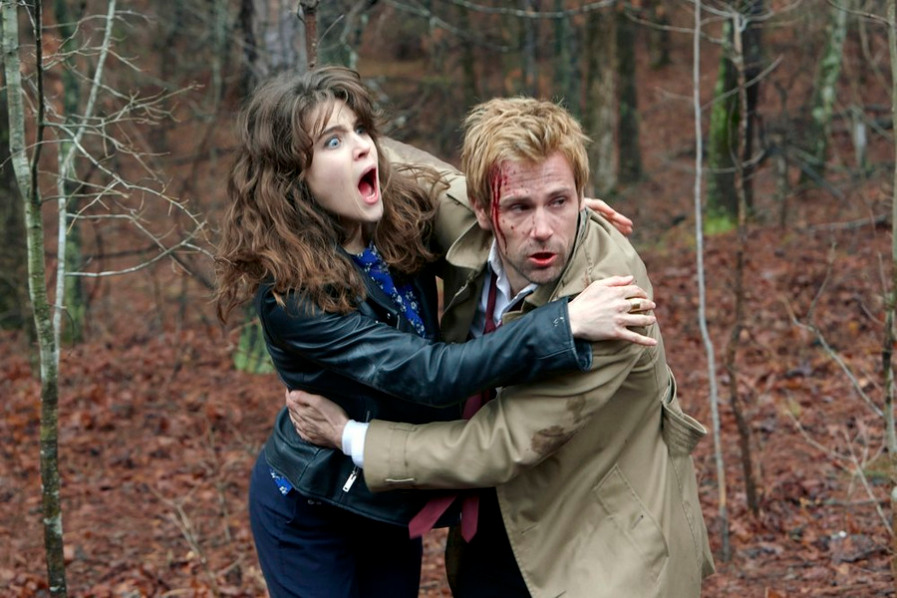 Just in time for Halloween, the NBC-TV gothic-action series Constantine arrived last week, with episode two scheduled for tonight at 10 p.m. EDT.
Just in time for Halloween, the NBC-TV gothic-action series Constantine arrived last week, with episode two scheduled for tonight at 10 p.m. EDT.
Based on a long-time DC comics series, Hellblazer, about an exorcist, demon hunter, and “master of the dark arts,” the show provides equal measures of action, neo-gothic imagery, and portentousness. Strangely enough, given the kind of atmosphere the show projects, the pilot episode is set in Atlanta, Georgia, not exactly a place known for ghost stories or diabolism—it has never even been a focal point of the Southern Gothic tradition. The producers merit some creativity points for that, or at least some credit for finding a cheap place to film which hasn’t been overused in dramas of this type.
Also a bit unusual is protagonist John Constantine: instead of casting a dark, brooding type of actor, the producers have engaged British thespian Matt Ryan, a lanky fellow with fair complexion and light-brown hair. Constantine, as is apparently required of a contemporary TV drama protagonist, has a tortured past—a failed exorcism he performed some time prior to the events of the pilot episode, of a nine-year-old girl, resulted in her being damned for eternity and dragged immediately to Hell, and also resulted in Constantine being eternally damned as well.
As a result of these traumas, Constantine is understandably quite troubled, yet Ryan lends the character a certain occasional jauntiness in addition to the expected depressiveness, enigmatic thought process, and bouts of cantankerousness reminiscent of Gregory House, M.D., all of which are obvious contemporary television indicators of eccentric genius. His TV “family” includes Manny, an angel (Harold Perrinrau); bodyguard-type Chas (Charles Halford); and young psychic Liv (Lucy Griffiths), whom an army of demons wants to kill and send to, you guessed it, eternal damnation.
Constantine, of course, ventures to protect her from this fate worse than death, setting in motion what is obviously going to be the main story arc of the series for the foreseeable future. It also turns out that her late father was an associate of Constantine, who also had psychic powers and could see demons and assorted supernatural bric-a-brac.
As noted, Constantine is based on the comic book series Hellblazer, but those who don’t read comic books may find it very reminiscent of the WB/CW series Supernatural and the Sam Raimi film Drag Me to Hell, both of which may well have been influenced by Hellblazer for all I know about such things. What Constantine definitely shares with Supernatural and Drag Me to Hell is an evident acceptance of the spiritual realm as real, as being a field of intense and high-stakes warfare, and as having immense spillover effects in the world of nature in which we live.
The stories of the comic book series ranged all over the place, from left-wing political messaging to personal-relationship dramas to, as would be expected given the series title, plenty of dealings with the occult, demons, and sinister humans who have given themselves over to dark powers. The pilot episode of the TV series concentrates on the latter category of subjects (without overlooking the personal relationships), rocketing quickly through a complicated storyline strewn with bizarre events—such as a marching army of cockroaches, human levitation, the supernatural butchering of a young woman, a man impaled by a demon-possessed electrical wire, and a few exorcisms along the way, complete with bizarre, multilingual ritual talk.
Over at the Huffington Post, they’re discussing a furor over the “straight-washing” apparently being perpetrated by the TV series: it seems that in the comic book series the protagonist is shown as having plenty of female lovers and also some male ones. The producers of the TV show apparently have said that they have no specific plans to introduce the latter element of the character into the show, and of course the expected army of professional complainers has raised a fuss over the decision, using a variety of angry and highly creative neologisms. Those who find such controversies either important or amusing may find out more at the HuffPo story.
Speaking of offending people, the “theology” behind Constantine is collected from a decidedly mixed bag of religions, though one can see that the producers have taken care not to offend any particular body of faith. And yes, that is a tricky thing to do, and the show might end up displeasing a good many devout religionists of various hues. They, however, are not the target audience for the series, so Constantine probably is accomplishing what the producers, and NBC, set out to do with it: reach enough religiously unaffiliated “seekers” and entertainment thrill-seekers among the millennial generation to pull in an audience sufficient for a network TV Friday night.

